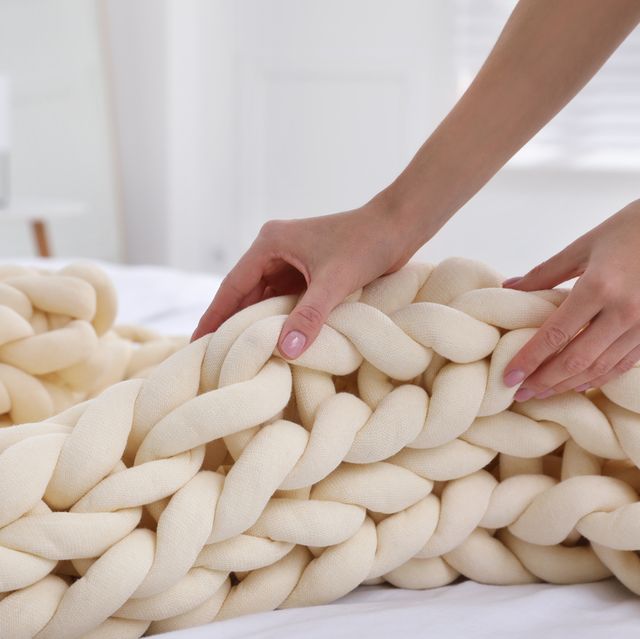If you've ever snoozed with a small child or a dog in your lap or against your belly, you know a little bit about how comforting the gentle pressure of their weight can be. A weighted blanket feels very much the same way, minus the breathing, drooling or startled wake-ups that can cut through your relaxed state.
According to data from Penn Medicine, a weighted blanket works through pressure therapy — the weight it puts on your body induces calm the same way being hugged, held or stroked would. The Sleep Foundation adds that this kind of deep, controlled stimulation can help you relax and sleep, the same way swaddled babies drift off. Our textiles experts in the Good Housekeeping Institute, who have tested and reviewed almost two dozen weighted blankets in recent years, say that because some are filled with tiny beads (often made of glass, plastic or sand), cozying up with one can indeed feel like a firm hug without anyone actually touching you.
The other kind of weighted blanket you can buy is knitted, woven with a thick yarn. You can get both types of weighted blankets in a rainbow of different colors, so they’ll match your bed or sofa just like a regular comforter or blanket would.
Benefits of a Weighted Blanket
FAQ
Who could benefit from a weighted blanket?
The fact that we all have anxiety at times may explain why so many of us cannot wait to get home and dive under our weighted blankets. While studies on their use in calming stress or anxiety are very small (which means more research is needed), they are believed to help with some people with anxiety, which is tied to both depression and insomnia, says Michelle Drerup, PsyD, Director of Behavioral Sleep Medicine at Cleveland Clinic Sleep Disorders Center. "In one study of 32 adults, 63% reported lower anxiety after lying under a 30 lb blanket for 5 minutes," says Drerup. "Another study of 30 adults who had been hospitalized for a mental health crisis found that 60% reported lower anxiety after using a weighted blanket." There are other small studies that found that participants with various sleep-disrupting conditions (including anxiety and depression) slept better with the use of a weighted blanket.
Occupational therapists who work with kids with Attention Deficit Hyperactivity Disorder (ADHD) and autism have also found weighted blankets helpful. "A weighted blanket is said to be designed to help your brain recognize your surroundings," says Drerup. "This can have a calming, focusing effect on the central nervous system, which may help someone with ADHD and autism." In fact, a 2022 study showed that using a weighted blanket significantly improved sleep problems in children with ADHD.
Who shouldn't use a weighted blanket?
The Good Housekeeping Institute does not recommend any weighted blanket for small children. "Weighted blankets shouldn’t be used by anyone who can’t move freely beneath the weight. Even though they're sometimes used as a therapeutic tool for children, it's important to first speak with a medical professional, like a child's pediatrician, before trying it out," says Sachs. Drerup doesn't advise them for anyone under age two, and says that the weight of the blanket should be roughly 10% of your body weight (a 150 lb person, then, could try a 15 lb blanket.)
There are also a few chronic illnesses that, if you have them, should lead you to proceed with caution. "A weighted blanket may also be unsuitable for people with certain conditions including diabetes, difficulty breathing, including asthma and obstructive sleep apnea, circulation or blood pressure issues, fragile skin, a rash or an open wound and claustrophobia," she says. If any of this sounds like you, check with your doctor before using one.
Are weighted blankets safe?
"When used the way they're supposed to, weighted blankets are very safe," says May-Benson. Again, just remember that if you're seeking relief from a medical condition, talk to a doctor first, and before getting a weighted blanket for a child, be sure to check with their pediatrician.
Is it OK to use a weighted blanket every night?
If your doctor says it's safe, you can use a weighted blanket every night, but you need to use time limitations at least at first as you get used to it.
Start off with a 20–30 minute nap under your blanket to see how you feel. Some people find weighted blankets can actually keep them awake because the weight raises their body temperature. Others find their muscles ache from the blanket, or they simply don't like the sensation. If you feel fine, do another 20–30 minutes under your blanket after a 90 minute or two-hour break, increasing your time gradually.
How to choose a weighted blanket
Since weighted blankets are so popular, you can find one to suit basically any of your preferences. When shopping for a weighted blanket, these are the different variables you can look for:
- Size: While some weighted blankets only come in one size, many are available in various sizes (our budget pick is available in six different sizes). Sachs recommends making sure your weighted blanket doesn't hang off your bed, so the extra weight doesn't pull it off of your body. She says that's why most brands' blankets will have a bit smaller dimensions than your typical twin- or king-size comforter.
- Weight: Weighted blankets are generally available in weights ranging from 10 to 20 pounds. But keep in mind that because of weight distribution, you'll feel more pressure with a 15-pound twin-size weighted blanket than with a king-size blanket of the same weight.
- Material: You can find weighted blankets that come in all different types of fabric, ranging from microfiber to cooling fabric (perfect for sweaty sleepers!). The Layla weighted blanket reaps another benefit: it's reversible and entirely machine-washable! Most weighted blankets just have machine-washable covers (not inserts), so you don't have to worry about breaking your washing machine by throwing an entire 15-pound blanket in it.















